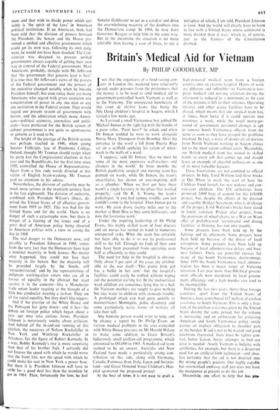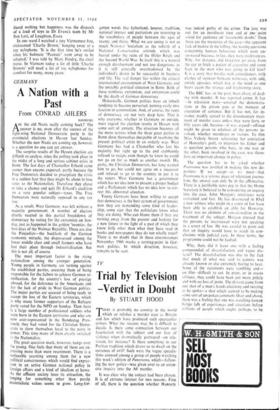Britain's Medical Aid for Vietnam
By PHILIP GOODHART, MP
T SEE that the organisers of a fund-raising con- cert in London this weekend have reluctantly agreed, under pressure from the performers, that
the money is to be used to send medical aid to government-controlled South Vietnam as well as to the Vietcong. The unexpected beneficiary of this coup de theatre looks like being the Nhi Dong children's hospital in Saigon, which I visited a few weeks ago.
As I arrived a small Vietnamese boy jabbed Dr Michael Inman in the right leg with the handle of a paint roller. 'Paint here?' he asked, and when Dr Inman nodded he went to work alongside Nurse Mary Thompson from Bromley. Over the entrance to the ward a GI from Puerto Rico sat on a scaffold applying his ration of white- wash to the walls of a ward.
'I suppose,' said Dr Inman, 'that we must be some of the most expensive wall-washers and cleaners in the world.' In three months the British paediatric surgical and nursing team has painted six wards, while Dr Inman, the team's anaesthetist, has shown an awe-inspiring skill as a plumber. 'When we first got here there wasn't a single lavatory in the place that worked properly,' said Dr R. S. Young, the team's pathologist, 'if you had tummy trouble, you just couldn't come to the hospital. Then Inman got to work. He even drove twenty miles out to the market at Binh Hoa to buy some ball-cocks, and now the lavatories work.'
Under the inspiring leadership of Dr Philip Evans, this highly skilled team of four doctors and six nurses has turned its hand to numerous unexpected tasks. What the team has certainly not been able to do is to use its professional skill to the full. Through no fault of their own they have been prevented from operating even half as efficiently as they could.
The need for help in the hospital is obvious. Only about 5 per cent of the cases are attribut- able to the war itself—'This pretty little girl has a bullet in her arm'—but the hospital's facilities could easily be trebled without wiping out the potential waiting list. In the malnutrition ward children are sometimes lying five to a bed. (In Vietnam mothers are taught to give nothing but rice water to children with stomach trouble. A prolonged attack can lead quite quickly to malnutrition.) Meningitis, polio, dysentery and some particularly nasty forms of malaria all take their toll.
Any humane person would want to help, and by chance a report by Dr Philip Evans on various medical problems in the area coincided with White House pressure on Mr Harold Wilson to make some addition to Great Britain's ludicrously small civilian-aid programme, which amounted to £81,000 in 1965. A medical-aid team seemed to be an answer. Australia and New Zealand have made a particularly strong con- tribution on this side, along with Germany, Canada, Formosa, Iran, Italy, Japan and Switzer- land—and Great Ormond Street Children's Hos- pital sponsored the proposed project.
At the best of times it is not easy to graft a high-powered medical tern from a foreign country into an existing 11pital. Hours of work are different and inflexible—in Vietnamese hos- pitals medical and nursing attention during the afternoon is reduced to a minimum, as the care of the patients is left to their relatives. Operating theatres and other scarce facilities have to be shared, which means that our surgical team has, at times, been lucky if it could operate two mornings a week, while the usual merry-go- round of government personnel changes is apt to remove South Vietnamese officials from the scene as soon as they have grasped the problems involved. In fact, a wave of dismissals of doctors from North Vietnam working in Saigon clinics led to the most recent cabinet crisis. Meanwhile, our British medical team has turned its skilled hands to every job that comes up, and should leave an example of cheerful enthusiasm as one of its most valuable legacies.
These frustrations are not confined to official projects. In July, Lord Walston laid three bricks at Qui Nhon to mark the start of Save the Children Fund hostels for war widows and con- valescent children. The US authorities have promised 2.000 bags of cement for this 1:18,000 project, but, despite the efforts of the devoted and capable Bridget Stevenson. who is in charge of the project, Lord Walston's bricks have stood in lonely isolation. Project after project, from the provision of wheel-chairs, to a War on Want offer of prefabricated 'recreational and dining facilities' at Danang, has run into trouble.
Some projects have been held up by the fighting and its aftermath. Some projects have been held up because of the threat of local corruption. Some projects have been held up because of local administrative delays and busi- ness failures. There are powerful excuses for many of the South Vietnamese shortcomings. Since 1959 the South Vietnamese local adminis- tration has been a major target of Vietcong terrorism. Last year more than 800 local govern- ment officials were murdered. In local govern- ment, efficiency and a high murder rate tend to be incompatible.
During the last two years, thirty-three foreign countries, apart from the United States of America, have contributed £17 million of civilian assistance to South Vietnam. This is only a frac- tion of the civilian assistance given by the United States during the same period, but the volume is increasing, and an enthusiasm for criticising American and South Vietnamese policy surely carries an implicit obligation to shoulder part of the burden. If aid is not to be wasted and good intentions frustrated, there must be tighter con- trol, better liaison, better attempts to find out what is needed—South Vietnam is bulging with antibiotics, for example, but there is a desperate need for an artificial-limb technician—and abso- lute certainty that the aid is not diverted into the wrong people's pockets. Our highly capable but overworked embassy staff just does not have the manpower at present to do this job.
Meanwhile, one effort to help that has pre.
duced nothing but happiness was the dispatch of a load of toys to Dr Evans's team by Mr Rex Levi, of Loughton, Essex.
In one ward I watched a tiny Vietnamese boy, nicknamed 'Charlie Brown,' banging away at a toy xylophone. 'It is the first time he's smiled since his bedmate "Peanuts" went away to be adopted,' I was told by Mary Pendry, the chief nurse. In Vietnam today a lot of little `Charlie Browns' will need a lot of toy xylophones for comfort for many, many years.







































 Previous page
Previous page